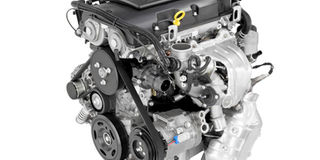My car makes irritating noises

What you need to know:
- That said, wear and tear of some suspension and steering components underneath the engine can make you think that the clanking or banging sounds are in the engine. A good technical inspection and road test should quickly establish the source of the different engine noises.
Dear Paul, My car makes irritating noises that I suspect are coming from within the engine. Every time I drive the car, it sounds and feels like someone is shaking all the car parts especially under the bonnet. I am now worried that something will fall off anytime. What could this be?
Harriet
An engine is the heart beat of any car, so any unusual noises from the engine bay should cause some concern. A car engine has more than 2,000 different moving and non-moving parts.
Keeping them in a good running condition is pertinent to the car’s good performance. When these different parts or components fail, they will trigger different symptoms which may include noises or unusual sounds.
It is necessary to distinguish between the unusual engine sounds or noises because they are telltale signs of different component failure. Here are a few suggestions that need to be followed through and confirmed by a mechanic or technician.
Stuttering
This is usually followed by engine hesitation and a common outcome of ignition system or fuel system failure. When you experience this it is time to check your engine (petrol) spark plugs, ignition coils or tension leads as well as the fuel system pressure (affected by filter and injectors).
Detonation or popping sound
It will be caused by a misfire due to fuel starvation if your engine has run out of fuel or has a restricted fuel supply problem.
Surging or erratic engine revs
This is a sign of deteriorating or reduced engine performance.
This can combine with an engine rattle especially when driving uphill. It is time to examine components that affect engine performance such as air intake (throttle, air flow meter, air cleaner, intake tunnel), engine timing in case that is retarded, fuel restriction due to a dirty fuel filter or damaged fuel pump or a leaking vacuum system. Again, a good mechanic will be able to discern and recommend.
Hissing or suction sounds can be a result of leaking coolant or escaping vacuum. Look out for steam or a higher than usual engine temperature. Leaking vacuum will cause unstable engine running because vacuum helps your engine ignition system to work efficiently.
Squealing or rattling sounds are usually caused by worn out viscous pulley belts or belt pulleys. Have them checked quickly before they fail you on a busy morning or late evening. Occasionally, continuous rattling sounds particularly during cold starts could be caused by a worn out timing chain kit (for newer petrol engines) or poor lubrication (oil starvation) of the timing case and valve train area.
These are sensitive and fast moving engine components that get damaged if they run dry because of slow buildup of engine oil pressure. You need to have your engine oil or lubrication system looked at; oil filter, engine oil quality, suitable engine oil viscosity and grade as recommended by a car manufacturer should not be ignored.
For instance, many car manufacturers recommend 5W30 fully synthetic engine oil for cars with timing chain kits because it is designed to maintain the highest performance and protection standards during start and engine running for the duration of drain intervals while preventing sludge buildup associated with delayed oil service or poor quality engine oil.
In extreme cases, oil starvation will cause clanking noises, a sign of metal damage due to shear or premature damage. That said, wear and tear of some suspension and steering components underneath the engine can make you think that the clanking or banging sounds are in the engine. A good technical inspection and road test should quickly establish the source of the different engine noises.




